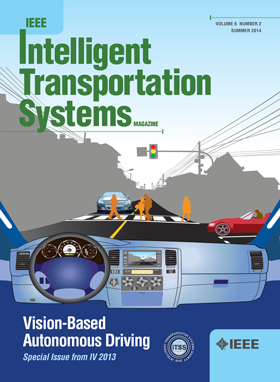基于边缘集中测量的形状相关混合模型的车辆跟踪
IF 8.4
1区 工程技术
Q1 ENGINEERING, CIVIL
IEEE Transactions on Intelligent Transportation Systems
Pub Date : 2025-04-15
DOI:10.1109/TITS.2025.3558529
引用次数: 0
摘要
对于跟踪矩形车辆,现实世界的汽车雷达位置测量值不是均匀分布在车辆上,而是通常分布在车辆的边缘,即测量值的分布与形状相关。为了描述这一现象,提出了一种形状相关的高斯混合测量模型,通过引入形状比例因子,每个混合分量用来描述一个子矩形区域。形状比例因子也是形状相关的,并且可以表征在相应边缘上的测量扩展。在该模型中,参数和混合结构高度依赖于形状,并引入了矩形形状先验信息。在此基础上,推导了一种变分贝叶斯方法,递归有效地估计车辆的运动学、形状、形状比例因子和方向状态。此外,多普勒速度测量也可以通过引入潜在变量集成到变分贝叶斯框架中。该方法能够有效地自适应描述复杂的测量分布。从仿真和实际实验结果来看,所提方法在跟踪性能上有较大的提高,在质心位置估计方面,与现有方法相比,所提模型的优越性能更为显著。本文章由计算机程序翻译,如有差异,请以英文原文为准。
Vehicle Tracking Using Shape-Dependent Mixture Model With Edge-Concentrated Measurements
For tracking a rectangular vehicle, real-world automotive radar position measurements are distributed not uniformly over the vehicle extension but typically around the edges of the vehicle, i.e., the distribution of measurements is shape-dependent. To describe this phenomenon, a shape-dependent Gaussian mixture measurement model is presented, with each mixture component being used to describe a sub-rectangle region by introducing a shape scaling factor. The shape scaling factor is also shape-dependent and can characterize the measurement spread across the corresponding edge. In this model, parameters and mixture structure are highly shape-dependent, and the rectangular shape prior information is also incorporated. Based on the proposed model, a variational Bayesian approach is derived, which recursively and efficiently estimates the kinematic, shape, shape scaling factors, and orientation states of a vehicle. Additionally, the Doppler velocity measurement can also be integrated into the variational Bayesian framework by introducing a latent variable. This approach can effectively and adaptively describe the complex measurement distribution. From the simulation and real experimental results, the proposed approach has a great improvement in the tracking performance, and the superior performance of the proposed model is more significant in estimating the centroid position compared with the state-of-the-art approaches.
求助全文
通过发布文献求助,成功后即可免费获取论文全文。
去求助
来源期刊

IEEE Transactions on Intelligent Transportation Systems
工程技术-工程:电子与电气
CiteScore
14.80
自引率
12.90%
发文量
1872
审稿时长
7.5 months
期刊介绍:
The theoretical, experimental and operational aspects of electrical and electronics engineering and information technologies as applied to Intelligent Transportation Systems (ITS). Intelligent Transportation Systems are defined as those systems utilizing synergistic technologies and systems engineering concepts to develop and improve transportation systems of all kinds. The scope of this interdisciplinary activity includes the promotion, consolidation and coordination of ITS technical activities among IEEE entities, and providing a focus for cooperative activities, both internally and externally.
 求助内容:
求助内容: 应助结果提醒方式:
应助结果提醒方式:


